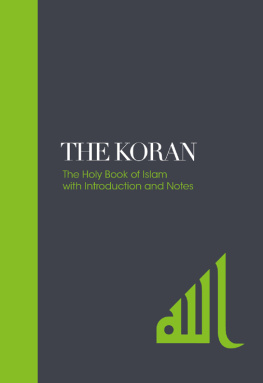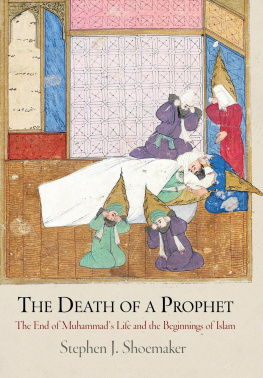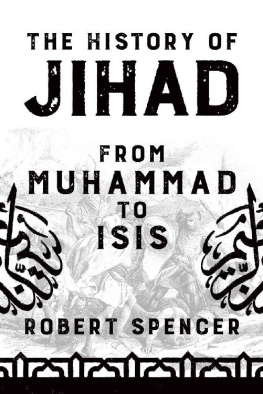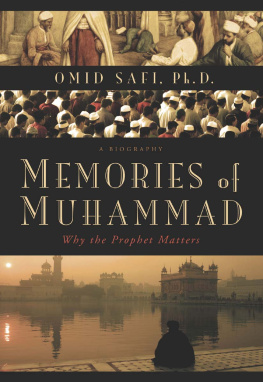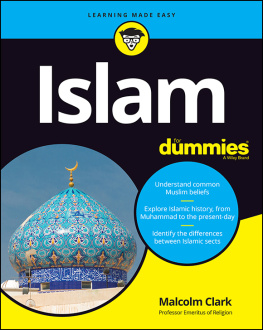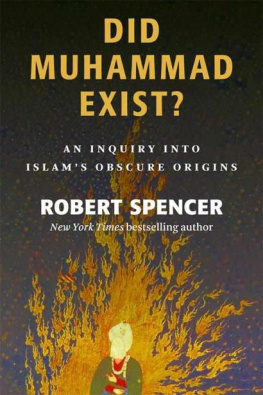
In more than fifty years of teaching History of Religions, from both Harvard and Chicago roots, I have never before encountered a work that shines with such authoritative and insightful scholarship, as well as methodological maturity, in two radically different traditionsindeed two civilizations. The mastery of primary languages and texts alone, in their social settings, is astonishing. But this book affords more than portraits of two towering figures in their full-bodied uniqueness. As their presence requires, it is finally an original perspective on faith, carefully developed theme by theme, which compels the reader to seek afresh, with awe and delight, One whom the author quietly names an open-hearted God, in an open-ended universe.
Harmon Hartzell Bro, Ph. D., theologian and former
graduate dean, author, A Seer Out of Season
A fascinating book; less the usual introduction than an in-depth study of Quranic themes. Combing years experience, piety, scholarship, and appreciation for things Islamic, the author offers personal and creative insights that help illuminate the landscape of Muslim-Christian dialogue. His view that the Quran was formulated by Muhammad enables him to portray the Prophet in very human terms and to read the Quran as he would the Bible, a text rich in themes both divine and human. It is an excellent resource for graduate and post-graduate students and others interested in enlarging their understanding and appreciation of Islam.
Harold Vogelaar, Ph. D., teaching scholar in residence for
Christian-Muslim relations, Lutheran School of Theology
I read through your book with great enthusiasm. It is an honest, courageous, and well-researched study of a religion that is more than any other calling for our attention. It is honest, as you combine your Christian faith with an eminent scholarship concerning Islam. It is courageous, as you are one of the few theologians who study Islam as a theologian; that is to say, you give Islam a place within the dealings of God with humankind within the history of salvation. You combine islamology with theology in liberating vision. It is well researched, as you give a proof of a life-long study of Islam, of mastering the most recent literature and of being fully informed about tragic and rather recent events concerning human rights in Turkey.
Arnulf Camps, O.F.M., past president,
International Association for Mission Studies
I am favorably impressed by the contribution this books makes toward increased mutual respect and fuller understanding among Muslims, Jews and Christians.
Rev. Durwood A. Busse, Wordwide Ministries Division,
Presbyterian Church (U.S.A.)
Also by R. H. Drummond
A History of Christianity in Japan
Gautama the Buddha: An Essay in Religious Understanding
Unto the Churches
Toward a New Age in Christian Theology
A Life of Jesus the Christ
A Broader Vision: Perspectives on the Buddha and the Christ

Copyright 2005
by Richard Henry Drummond
All rights reserved, including the right to reproduce this work in any form whatsoever, without permission in writing from the publisher, except for brief passages in connection with a review.
Cover design by Grace Pedalino
Cover digital imagery Getty Images/Photodisc. All rights reserved.
Excerpts reprinted with the permission of Scribner, an imprint of Simon & Schuster Adult Publishing Group, from The Koran Interpreted by A. J. Arberry.
Copyright 1955 by George Allen & Unwin Ltd.
Map inside front cover:
The Spread of Islam and Christianity 2005 Maps.com
Map inside back cover:
Muhammads Missions and Campaign to 632 Cartographica Limited.
Hampton Roads Publishing Company, Inc.
1125 Stoney Ridge Road
Charlottesville, VA 22902
434-296-2772
fax: 434-296-5096
e-mail:
www.hrpub.com
If you are unable to order this book from your local bookseller, you may order directly from the publisher.
Call 1-800-766-8009, toll-free.
Library of Congress Cataloging-in-Publication Data
Drummond, R. H., 1916
Islam for the Western mind: understanding Muhammad and the Koran / R. H. Drummond.
p. cm.
Summary: Surveys the life and times of Muhammad and the rise of Islam, including the prophets visions and the politics that shaped his messageProvided by publisher.
Includes bibliographical references and index.
ISBN 1-57174-424-X (5-1/2x8-1/2 tp: alk. paper)
1. Islam. 2. Murhammad, Prophet, d. 632. 3. Islam-Doctrines. I. Title.
BP161. 3. D78 2005
297--dc22
2005015508
ISBN 1-57174-424-X
10 9 8 7 6 5 4 3 2
Printed on acid-free paper in Canada
To Pearl, who has walked with me
on this way to a broader vision.
CONTENTS
PREFACE
No serious book about Islam could properly be written in these days without reference to the tragic events of September 11, 2001, and their aftermath. Readers will recall that 19 Muslims of Egyptian and Saudi Arabian background hijacked four American passenger planes. Three of them wrought very great loss of life and destruction of property, two of them upon the World Trade Center in New York, the third upon the Pentagon in Washington, D.C. The fourth plane crashed in a meadow in Pennsylvania, killing all on board. The shock of these eventsthe first overt large-scale attack on the continental United States since the War of 1812was very great both within and without the United States. Out of this has come widespread knowledge of a worldwide network of Muslim terrorist activity, called al-Qaeda (the Base), aimed at the United States and, more generally, the entire Western world. (The capitalized word Western, it should be noted, is here to be understood in a cultural and religious sense rather than a geographical one.)
The leader of this network was found to be one Osama bin Laden, a wealthy, charismatic former citizen of Saudi Arabia. This man has come to be seen as a Muslim singularly devout in his own interpretation of Muslim faith, a faith at least in part influenced by the harshly puritanical Wahabi sect of his homeland. Bin Laden and his colleagues in their worldwide network were seen at first as the primary culprits in aggressive activity, and the war in Afghanistan was the result. This military effort, widely supported throughout most Western lands, was designed to overthrow the Taliban Afghan government that was providing training grounds and otherwise safe haven for Osama bin Laden and his growing number of followers. This military effort largely succeeded, but from this there developed the American decision to invade the neighboring and populous country of Iraq, which was highly civilized, although ruled by a ruthless and corrupt dictator, Saddam Hussein. This invasion, largely the result of unilateral American decision-making, found the United States with substantial support only from the United Kingdom, token support from a number of other nations, and often strong opposition from countries such as France and Germany. It seems that the general populace of most countries in the Western world oppose the American-led invasion/intervention. All in all, as the war, now a kind of guerrilla war, drags on, there seems to be a crisis in leadership styles, largely, I believe, owing to inadequate understanding of the world of Islam, its faith (in all its varieties), and its practices (in all their varieties).
Next page








